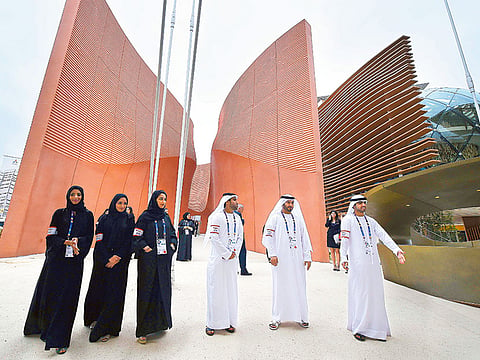Expo 2015 shows potential as diplomatic backdrop
North Korea stepped out of its isolation as a last-minute participant

Milan: The Expo 2015 world’s fair is showing surprising potential as a backdrop for some serious diplomacy as it opens Friday for a six-month run.
North Korea stepped out of its isolation as a last-minute participant, and there are signs that Turkey may use the occasion to reach out to the Vatican weeks after it recalled its ambassador to the Holy See over the pope describing the slaughter of Armenians by Ottoman Turks as genocide.
With food as the theme of this year’s event, culinary delights from host Italy and beyond will be one of the main draws for the 20 million visitors expected to attend.
But the Milan Expo already had ambitions beyond the usual gather, meet and innovate exhibition, with the Italian government backing a process to create a document of concrete solutions to fight hunger and combat food waste, among other goals.
The ambition of the so-called “Milan Charter” is to get individuals, civil society and business to commit to a series of solutions, a diplomatic trend that recognises that some problems are too vast for governments alone to resolve.
“What the Italians are doing with this international exposition is creating a global platform that brings the representatives of 145 countries together convening around a key topic, that is food and food security, and the question of how to feed 9 billion people,” said Philip T. Reeker, the US consul general in Milan.
He called it “the essence of public diplomacy” focused on “a policy question that concerns us all.”
Still, there are signs the Expo could play host to something more than soft diplomacy.
The Vatican’s top culture official, Cardinal Gianfranco Ravasi this week welcomed the prospect of an invitation to the Turkish pavilion, and extended his own to Turkish officials to visit the Vatican pavilion “dedicated to themes that can be shared also by the Muslim world.” He cited spiritual and physical hunger, brotherly charity and fasting as examples.
The addition of North Korea just weeks before the opening was unexpected. Expo officials have included the isolationist nation in a thematic cluster dedicated to islands — perhaps more metaphorically than geographically apt.
Not all of the diplomatic signals around Expo have been positive. India, in a drawn-out dispute with Italy over its determination to put two Italian sailors on trial for the shooting deaths at sea of two fishermen, skipped the global event due to the tensions, Expo organisers said.
While the Milan Charter may bring progress on the topical theme of food security, former Italian diplomat Sergio Romano cautioned against expecting any political breakthroughs on the sidelines of the event.
“Expo, I think, cannot produce any policy whatsoever because it isn’t their job. What it can do is get people to the same place with all the possible advantages it can create,” said Romano, a leading political commentator. “It would be wrong to try to produce political results, because it is basically an economic exhibit.”
The fair is also expected to be a lightning rod for antiglobalisation protesters, with authorities warning that the infiltration of anarchists could spark violence. A student protest on Thursday proceeded through Milan mostly peacefully.
Participants said they opposed the inclusion of food corporations like Coca Cola, Nestle and McDonald’s in the fair.
Protester Selam Tesfai said the food corporations don’t adhere to the expo’s slogans of “feeding the planet” and “energy for life.”
“They only gonna to try to make profits on our lives, and we are tired of that,” she said.



